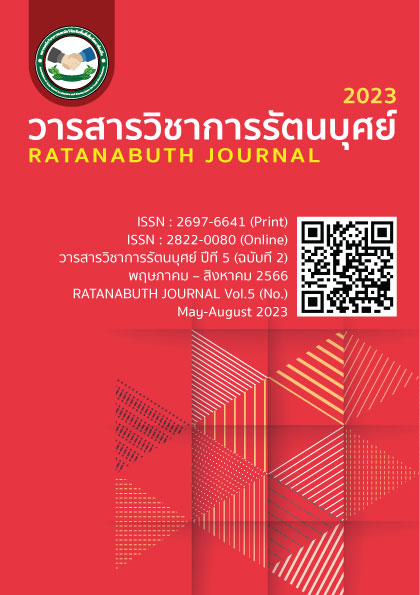The use of Merit-Kiriya-Wathu 3 Principles for Improving the Quality of Life of the Elderly in the Northeastern Region The use of Merit-Kiriya-Wathu 3 Principles for Improving the Quality of Life of the Elderly in the Northeastern Region
Main Article Content
Abstract
Research on this subject purpose 1) to study the development of the quality of life of the elderly in the northeast 2) to study the use of merit-kiriyawathu 3 for the development of the quality of life of the elderly in the northeast 3) To suggest the use of Meritkiriyawathu 3 for improving the quality of life of the elderly in the northeastern region. The sample used in the research were 86 elderly people aged 60 years and over, both. The tool used to collect data was a questionnaire. The statistics used to analyze data from the questionnaire were frequency, percentage, mean, standard deviation.
The research found that 1) The development of the quality of life of the elderly in the northeastern region, including all 3 aspects, was at a high level. When considering each side, the averages can be ordered from descending to the lowest, namely the 2nd aspect of living conditions, followed by the 2nd aspect of physical condition, and the least of the 1st aspect of emotional condition. 2). A model for enhancing attitudes towards learning Thai dialects for children and adolescents in the Upper Northeast of Sukapi. Overall, the 4 aspects are very high. Considering each aspect, it can be ranked by the mean of the least to least. The third is the key (Q), the second is the Chi (thinking) and the least is the first (listening). 3) The use of the principle of merit-kiriyawathu 3 for improving the quality of life of the elderly in the northeastern region, including all 3 aspects, was at a high level. When considering each side, it can be ranked in order of average from descending, namely the 2nd aspect of precepts, the 3rd aspect of prayer, and the least aspect of the 1st aspect of alms giving. 4) Handbook for the promotion of attitudes towards learning Thai dialects for children and youth in accordance with the Suchitipoli principle, the lower northeast region It was found that according to the principles and reasons, the objectives of the promotion of Thai language learning for children and youth according to the Supuli principle, the activities used Operating procedures Expected results Monitoring and evaluation.
Article Details

This work is licensed under a Creative Commons Attribution-NonCommercial-NoDerivatives 4.0 International License.
References
คณะกรรมการผู้สูงอายุแห่งชาติ กรมกิจการผู้สูงอายุ กระทรวงการพัฒนาสังคมและความมั่นคงของมนุษย์. (2561). แผนผู้สูงอายุแห่งชาติ ฉบับที่ 2 (พ.ศ. 2545 – 2564) ฉบับปรับปรุงครั้งที่ 2 พ.ศ. 2561. กรุงเทพฯ: กรมกิจการผู้สูงอายุ กระทรวงการพัฒนาสังคมและความมั่นคงของมนุษย์.
ชมพูนุท พรหมภักดิ์. (2556). การเข้าสู่สังคมผู้สูงอายุของประเทศไทย. กรุงเทพฯ: สำนักวิชาการสำนักเลขาธิการวุฒิสภา.
ฐากูร หอมกลิ่น. (2562). คุณภาพชีวิตของผู้สูงอายุในเขตเทศบาลตำบลท่ายาง อำเภอท่ายาง จังหวัดเพชรบุรี.วารสารวิจัยและพัฒนา มหาวิทยาลัยราชภัฏเลย. 14(49), 85-93.
ธีรนุช ชละเอม ยุวดี ลีลัคนาวีระ พรนภา หอมสินธุ์. (2560). ปัจจัยที่สัมพันธ์กับกิจกรรมทางกายของผู้สูงอายุในชุมชน ตำบลบางกระสอ อำเภอเมือง จังหวัดนนทบุรี. วารสารการพยาบาลและการศึกษา. 10(2), 19-32.
นิริศรา เปรมศรี สุทธิรักษ์ วิเศษสังข์ ประชาชาติ อ่อนคำ วัฒนพงษ์ คงสืบเสาะ ชยานนท์ อวิคุณประเสริฐ. (2559). การศึกษาสมรรถภาพทางกาย และสุขภาพจิตในกลุ่มผู้สูงอายุ กรณีศึกษาผู้สูงอายุในเขตอำเภอเมือง จังหวัดนครพนม. วารสารมนุษย์ศาสตร์และสังคมศาสตร์ มหาวิทยาลัยนครพนม. 6(3), 18-25.
บรรจง ลาวะลี และคณะ. (2564). การพัฒนากิจกรรมนันทนาการเพื่อสร้างสมรรถนะจิตใจและทางกายของโรงเรียนผู้สูงอายุในภาคตะวันออกเฉียงเหนือ. วารสารพุทธมัคค์ ศูนย์วิจัยธรรมศึกษา. 6(2), 77-86.
พระครูวินัยธรอำนาจ พลปญฺโญ และคณะ. (2561). รูปแบบการพัฒนาสุขภาพจิตของผู้สูงอายุตามหลักธรรม : กรณีศึกษาตำบลบ้านปรือ อำเภอกระสัง จังหวัดบุรีรัมย์. วารสารวิจัยและพัฒนา มหาวิทยาลัยราชภัฏบุรีรัมย์. 13(2), 81-82.
พระครูอรรถจริยานุวัตร และคณะ. (2561). วัดเพื่อผู้สูงอายุ : รูปแบบการดำเนินกิจกรรมเพื่อรองรับสังคมผู้สูงอายุในวัดอย่างยั่งยืน. รายงานการวิจัย. นครปฐม : สถาบันวิจัยญาณสังวร มหาวิทยาลัยมหามกุฏราชวิทยาลัย.
พระสราวุฒิ ปญฺญาวุฑฺโฒ. (2560). การพัฒนาคุณภาพชีวิตของผู้สูงอายุตามแนว ุตามแนวพระพุทธศาสนาในมหาบัณฑิต สาขาวิชาการสอนสังคมศึกษา. คณะศึกษาศาสตร์: มหาวิทยาลัยเชียงใหม่.
เขตเทศบาลตำบลวังหงส์ อำเภอเมือง จังหวัดแพร. วารสาร มจร พุทธปัญญาปริทรรศน์. 2(2), 58-59.
สถาบันวิจัยประชากรและสังคม มหาวิทยาลัยมหิดล. (2556). มโนทัศน์ใหม่ของนิยามผู้สูงอายุและมุมมองเชิงจิตวิทยาสังคมและสุขภาพ. นครปฐม: โรงพิมพ์เดือนตุลา.
สมบัติ กาวิลเครือ (2560). ปัจจัยที่เกี่ยวข้องกับพฤติกรรมการออกกำลังกายของผู้สูงอายุ อำเภอเสริมงาม จังหวัดลำปาง. วารสารดุษฎีบัณฑิตทางสังคมศาสตร์. 7(3), 161-173.
พระพรหมคุณาภรณ์ (ป.อ. ปยุตฺโต. (2551). พจนานุกรมพุทธศาสน์ฉบับประมวลศัพท์ (ชําระ-เพิ่มเติม ช่วงที่ 1). พิมพ์ครั้งที่ 12. กรุงเทพฯ: มหาวิทยาลัยมหาจุฬาลงกรณราชวิทยาลัย.
สนธยา พลศรี. (2545). ทฤษฎีและหลักการพัฒนาชุมชน. กรุงเทพฯ: โอเดียนสโตร
บุญชม ศรีสะอาด. (2543). การวิจัยเบื้องต้น. พิมพ์ครั้งที่ 6. กรุงเทพฯ: สุวีริยสาส์น.
บุญรอด บุญเกิด และพิชญรัตน์ เหมนำไลย (2562). แนวทางส่งเสริมการดำเนินชีวิตตามหลักศีล 5 ของผู้สูงอายุในจังหวัดชลบุรี. วารสารวิชาการมหาวิทยาลัยราชภัฏภูเก็ต. 15(2), 11-26.
สุวิมลรัตน์ รอบรู้เจน (2560). การพัฒนารูปแบบการดูแลสุขภาพผู้สูงอายุ สำหรับผู้ดูแลผู้สูงอายุ อำเภอวารินชำราบ จังหวัดอุบลราชธานี. วารสารมหาวิทยาลัยนราธิวาสราชนครินทร์. 9(3), 57-69.


